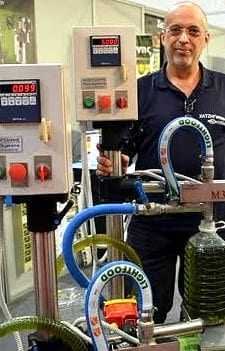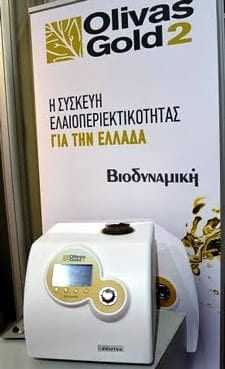The 6th Annual Eleotechnia Mediterranean Exhibition of Olive Oil opened with a record number of participants. The four-day event began on March 7th at the Ellinko Airport in Athens featuring 230 businesses involved in the export, production and marketing of Greek olive oil. Eleotechnia featured several speakers and seminars and it’s considered the largest exhibition of its kind in Greece.
“The main goal for many producers here is to learn how to export quality extra virgin olive oil abroad or to broaden their markets,” said George Kouvelis, managing director of Eleotechnia. “We’re also seeing Greek companies that are innovating during the crisis with new products and technology which is great for producers who are interested in improving their overall olive oil producing process.”
New to the World

One olive oil’s unique, sleek, earth-colored glass bottles attracted a constant stream of attention from exhibition participants. It was the first exhibition for Monakrivo, an extra-virgin olive oil company hailing from the Peloponnese region of the country.
“Our name in Greek means unique, precious and beloved. Eleotexnia is an opportunity for us to show off those characteristics. There is a market for superior products like ours,” said Zoë Panagiotopoulou who helped start the family business a few months ago. “Plus, our olive oils are entrenched in ancient history.”
The company’s olive groves sit along a 54 kilometer walking path that athletes traveled to reach the ancient Olympic Games. Panagiotopoulou explains the grove is filled with 16,000 olive trees producing Koroneiki variety olives.
“It’s not a product we plan to sell here in Greece. We aim for foreign markets. We’d love to export to places like the UK and Germany and, one day, America. This is just the beginning. We are new to the industry but we believe we have excellent production.”
Engineering in Greece

When it comes to production, Giorgios Hatzigiannis has 15 years of experience manufacturing industry equipment.
“We produce filling machines with absolute accuracy. Not one drop off when it comes to filling 50 milliliters to up to 20 kilograms of olive oil,” said Hatzigiannis as he demonstrated his company’s latest product on the market, the M31 filling machine.
The filling machine is one of many semiautomatic and automatic machines engineered and made in Greece that Hatzigiannis markets in Greece and abroad.
“We love what we do and we put ourselves in the client’s shoes. We adjust and improve our products to provide the best service. Besides that we make sure clients understand the whole process of olive oil making as we also began exporting olive oil as well.”
Technology and Tradition

If the little saucer of black olive paste didn’t sit on top of the Olivas Gold 2 machine it would look like an oversized printer. It’s actually the first olive analysis computer of its kind introduced to the Greek market. The company behind its creation, Biodynamiki, began their attempt to sell it to Greek olive mills, producers and organizations almost a decade ago. However, Helen Papaioannou, a marketing manager at the company says Greeks began to take notice of what it can achieve just recently.
“Using this technology is a new concept here. Producers and mills are traditionalists and are reluctant. It helps if someone they know or someone in town has implemented the technology — then will they take a closer look,” explained Papaioannou. “Through word of mouth people have learned about the computer’s amazing accuracy. It has proven to save a lot of time and money in the industry.”
The Olivas Gold 2, the latest version of the machine, analyzes an olive fruit sample. Immediately, it can inform producers and olive mills about the exact amount of oil that can be produced from each olive, even from the seed itself. As a result, the producer can determine if their olives are at their best and ripe for picking, and whether they should wait to harvest or not. Armed with such information, olive mills can set their milling processes to the exact settings best for extraction, settings that are dependent on the characteristics of each harvest.
Papaioannou said because the device can calculate how much olive oil can eventually be extracted from an entire harvest, the days of delivering olives, extracting them and then weighing them to determine payment – are over.
“Everything can be calculated beforehand.”
The machine costs around 30,000 euro ($42,000 USD). It’s an investment that Papaioannou says is worth it.
“From a small sample of an olive fruit, olive oil makers can maximize their productivity while adding to the olive oil’s quality. It’s a technological tool that’s finally making its way in the olive oil industry in Greece.”
